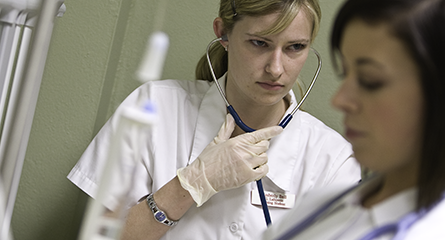In late December, 75 seniors graduated from the University of Louisiana at Lafayette’s traditional bachelor of science in nursing program. All but three or four of them had secured jobs prior to Commencement.
Dr. Melinda Oberleitner, associate dean of the College of Nursing and Allied Health Professions, said those employment numbers reflect an increasing demand for well-prepared nurses who hold bachelor’s degrees.
“Many facilities in our area, in our region and across the country are looking to hire baccalaureate-prepared nurses,” she said.
Research shows that nurses who receive bachelor’s-level preparation have better patient outcomes than nurses who hold associate degrees, including lower mortality and failure-to-rescue rates, Oberleitner said.
In 2010, the Institute of Medicine issued a report that calls for 80 percent of the nursing workforce to hold at least a bachelor’s degree by 2020.
According to an AACN report, “The Impact of Education on Nursing Practice,” BSN nurses are prized for their skills in critical thinking, leadership, case management, and health promotion and for their ability to practice across a variety of inpatient and outpatient settings.”
Oberleitner said the College of Nursing and Allied Health Professions has “evaluation data from our alumni, who report that they feel well prepared, and from the employers of our graduates, who agree that our graduates are well prepared. We collect those data every spring.”
Over the past 25 years, UL Lafayette nursing graduates have achieved first-time pass rates for the National Council Licensure Examination for Registered Nurses that, consistently, far exceed national and state averages.
In November, the baccalaureate program in UL Lafayette’s College of Nursing and Allied Health Professions earned continued accreditation by the Commission on Collegiate Nursing Education – without any recommendations for improvement. So did its master of science in nursing, which is offered through the Intercollegiate Consortium for a Master of Science in Nursing.
In 2012, UL Lafayette implemented an online Registered Nurse to Bachelor of Science in Nursing Program. The program enables registered nurses who hold associate degrees to earn BSN degrees, sometimes at an accelerated pace.
Enrollment for the next RN to BSN session, which begins later this month, has reached about 500. “That tells you that nurses themselves who hold associate degrees know that they’ve got to continue their education for preferential hiring and for career mobility,” Oberleitner said.
National surveys have shown that a registered nurse with a bachelor’s degree can earn about 10 percent more than a nurse who holds an associate degree. Recent research has also indicated that better-educated nurses have higher levels of job satisfaction.
Oberleitner said the demand for nurses with bachelor’s degrees – and higher degrees – is expected to increase. She urges high school students who have good grades, scored well on the ACT test, and are considering nursing as a profession, to aim for a bachelor’s degree first, rather than an associate degree.
“Obtaining an associate’s degree in nursing delays progression in the field, educationally as well as for many employment prospects,” she said.
Some hospitals have achieved the designation of “Magnet facilities” by the American Nurses Credentialing Center, for example. They are known for “quality patient care, nursing excellence and innovations in professional nursing practice,” according to the ANCC. There are no Magnet hospitals in Lafayette, but there are some in Baton Rouge and New Orleans. To maintain a “Magnet facility” designation, 80 percent of a hospital’s direct care nurses must be BSN-prepared by 2020, which mirrors the IOM recommendations.
“You can’t become a manager in a Magnet hospital unless you have a baccalaureate or graduate degree,” Oberleitner said. Chief nursing officers at Magnet facilities are required to have a graduate degree; if that graduate degree isn’t in nursing, a CNO must have a bachelor’s degree or doctorate in nursing.
Also, the Affordable Care Act is expected to increase the demand for nurse practitioners. Typically, nurse practitioners must have at least bachelor’s and master’s degrees.
